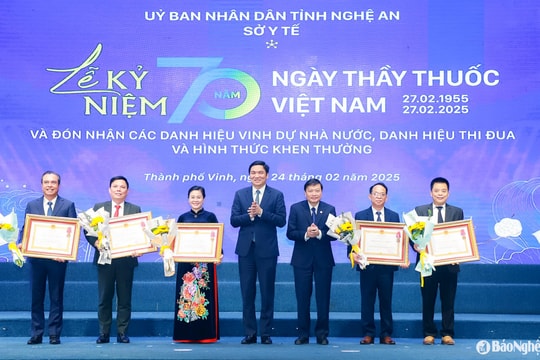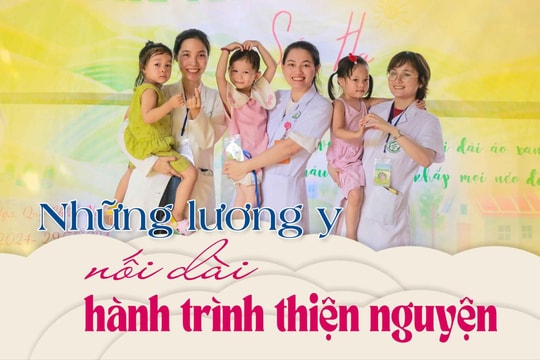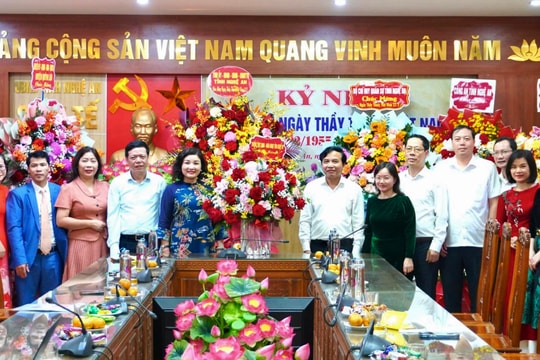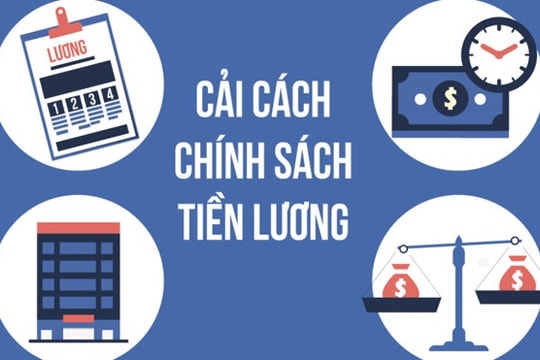Nghe An border military medics save people between 'the line between life and death'
(Baonghean.vn) - The stories and realities of medical examination and treatment of doctors and soldiers in remote border areas have shown a reality that people in remote areas, remote areas, and ethnic minority areas still face many difficulties and limitations, which greatly affect their health and lives.
Painful suicide cases
In the first days of Spring, the weather is freezing cold, but life in the villages of Na Ngoi commune (Ky Son) still flows smoothly. At the Military and Civilian Medical Clinic ofDefense Economic Group 4Located in Phu Kha 2 village, doctors are still working hard to examine and treat patients. This place has become a familiar address for poor people when they encounter bad health and life problems. Not only that, the infirmary is also a place to treat many cases of suicide by using poisons, the most common are poison ivy and pesticides.
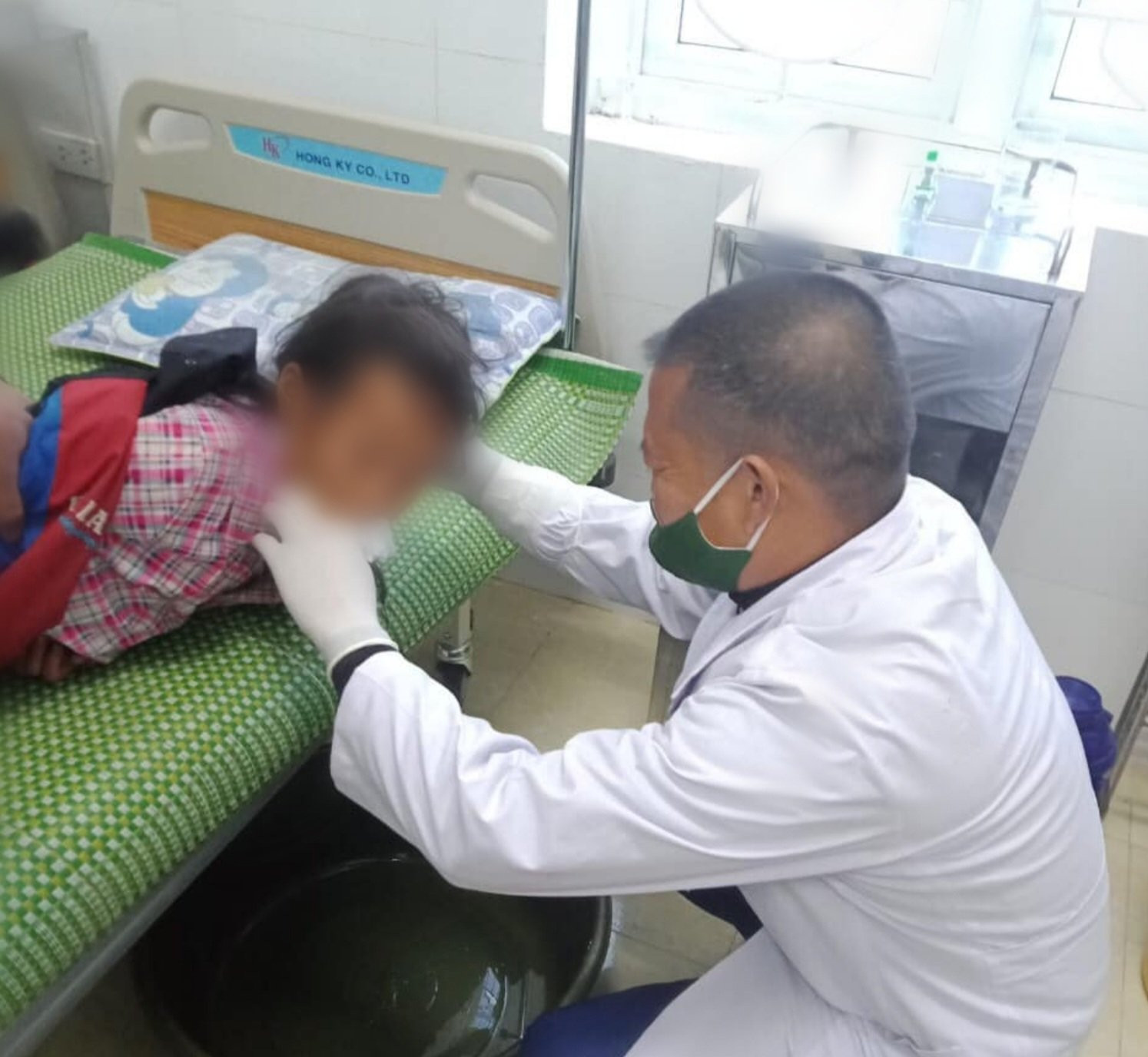 |
| Military medical staff of the 4th National Defense Economic Group give first aid to a victim of poison ivy. Photo courtesy |
Doctors at the infirmary said that the problem of suicide by poison ivy and pesticides is still happening today. Although the number of cases has decreased compared to many years ago, it is still a painful reality in Na Ngoi villages and some other communes and districts in the West. "Most recently, on February 9, just a few days after the Lunar New Year, we received an emergency case due toeat poison ivy"suicide," said doctor Nguyen Cong Minh.
It was a very young girl, born in 2005, who, because of a small family conflict, decided to take her own life. When her family brought her to the infirmary at 4 p.m., the patient was in a daze, almost unconscious. When they learned that the patient had eaten aconite, the doctors and nurses quickly performed emergency measures to induce vomiting and wash the intestines to reduce the effects of the poison and transferred the patient to a higher level to continue the detoxification treatment steps, saving her life. Fortunately for the patient, her family discovered it early and took her to the infirmary immediately. Previously, another case of aconite poisoning was also "rescued" from the hands of death by the doctors and nurses here, that was XYB in Pu Quac 3 village, born in 2013, on the way home from school she ate aconite.
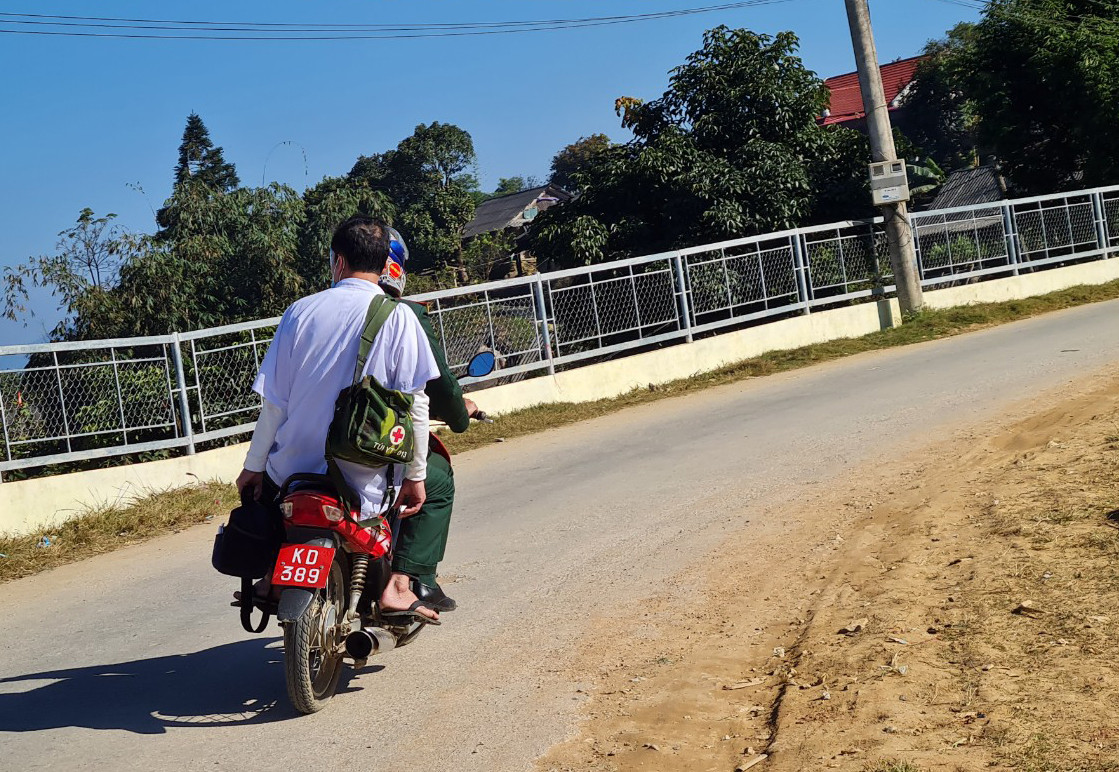 |
| Medical staff of Military Economic Group 4 return to the medical facility to examine and treat people. Photo: Hoai Thu |
Also according to the doctors in this border area, in Na Ngoi commune, in 2021, the unit received 6 cases of eating poison ivy and 2 cases of drinking pesticides with the intention of ending their own lives. After receiving emergency care and saving their lives, those cases said that the reason for their foolish actions was mainly due to family conflicts. Just because they were not satisfied with something in life, they sought death. After each emergency case, each time they witnessed patients in pain, even dying from the toxic substances they drank themselves, the doctors and nurses could not help but feel remorseful.
“If the number of leaves eaten is not much, about 1-3 leaves, and is discovered within 1 hour after eating, and the victim does not drink water, then there is hope of being saved by inducing vomiting and washing the intestines as soon as possible. Emergency treatment requires urgency and positivity, in which the most important is good respiratory control, stopping convulsions and treating cardiac arrhythmia because the patient can easily die after 1-7 hours of poisoning. Poison leaves contain highly toxic substances, when eaten, they will cause burns, corrode the intestines, and rupture internal organs containing the poison of the leaves. In particular, if you eat poison leaves with water or alcohol, even just a few leaves will cause rapid death, almost immediately after eating” - Doctor Nguyen Cong Minh said.
Saving people on the border between life and death
During the years of working and being close to the people in the villages of the border communes where the 4th National Defense Economic Group is stationed, generations of doctors and nurses have gone through thousands of medical examinations and treatments, and thousands of trips to the villages to take care of the people's health. In the countless situations that doctors and nurses have handled, besides the emergency cases caused by the problem of eating poison ivy, a large proportion are also cases related to women's childbirth. Previously, the people still maintained the backward concept that a woman's body, even when in critical illness, should not be "seen" by strangers. Therefore, for a long time, the people maintained the practice of giving birth at home, leading to many cases of complications during childbirth that caused the death of the mother or child, or both mother and child.
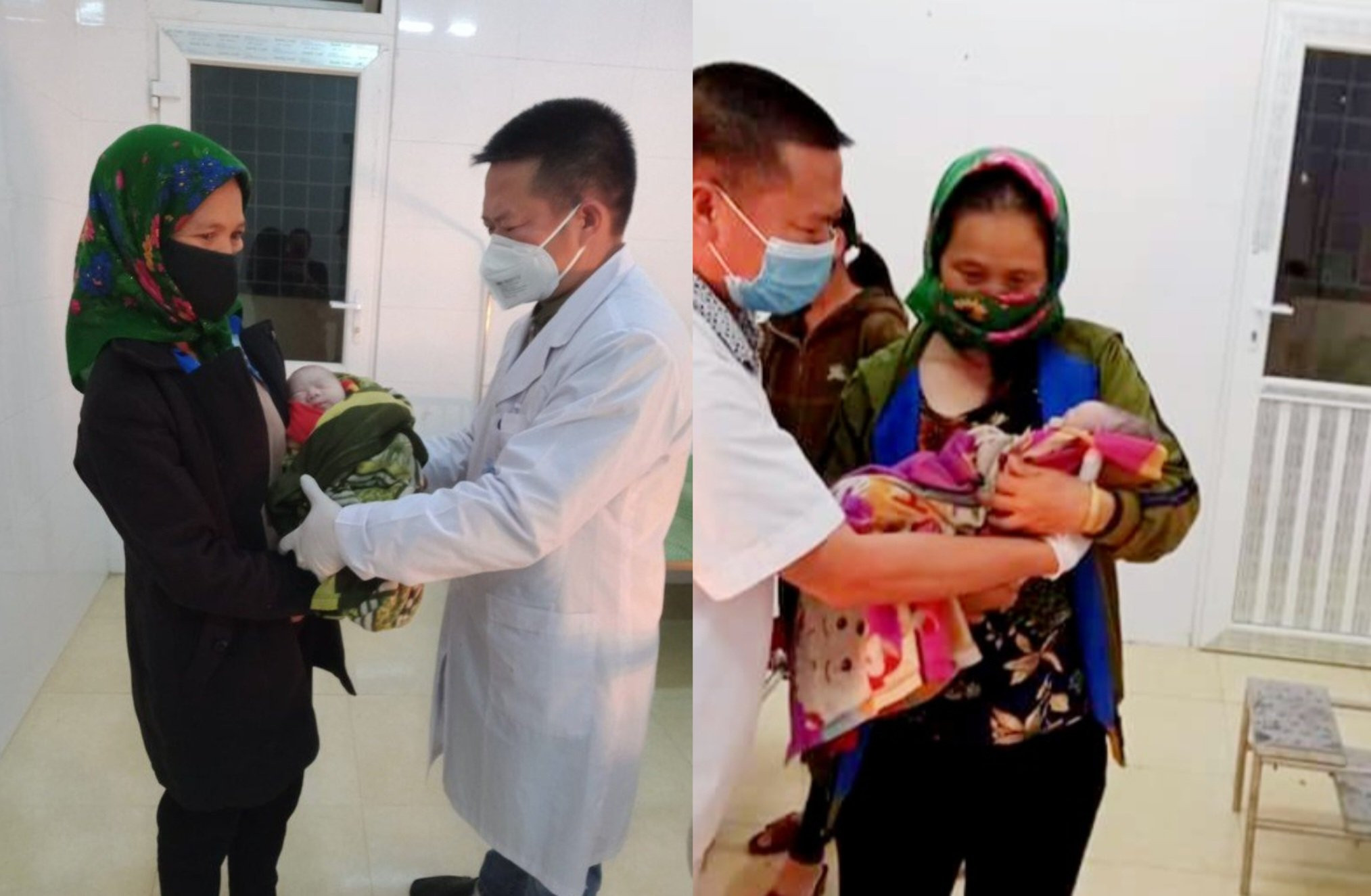 |
| Pregnant women with dangerous breech and transverse positions during childbirth were given timely emergency care by doctors. Photo courtesy |
“Fortunately, that situation has gradually decreased over the years. For many years now, the villagers have formed the habit of going to the doctor and the infirmary whenever they are sick or giving birth,” said Dr. Nguyen Cong Minh. Dr. Minh also shared that this is one of the joys of a military doctor in this remote border area. Because anyone who has come and witnessed the lives of the Na Ngoi people in the 1990s and before can see the terrible harm of some bad customs on the lives of the villagers. In the past, whenever someone in a family was sick, they would perform a ceremony themselves or invite a “forest ghost” shaman, with the belief that the sick person was taken by a forest ghost. Because of that belief, countless lives had to end in an unjust manner when they were not treated promptly by modern medicine, especially for difficult births.
| Phu Kha 2 village chief - Mr. Mua Chong Cha talked about the help of military doctors in taking care of people's health in Na Ngoi. Clip: Hoai Thu |
For example, the case of pregnant woman Ha Y Dia, born in 2003 in Ka Tren village, Na Ngoi commune, was taken to the infirmary of the National Defense Economic Group 4 at 1:00 a.m. on January 5, 2022, in a state of fatigue and severe abdominal pain. After examining and performing an ultrasound on Ms. Dia, the doctors diagnosed that the pregnancy was over 39 weeks and there were signs of labor. However, this was a difficult birth because the pregnant woman was in a transverse position - a very rare type of fetal position, accounting for only 1% of births in the world. With a transverse position, the safest method is a cesarean section.
However, in remote places like the border commune of Na Ngoi, cesarean section is almost impossible due to limitations in facilities and equipment. In addition, in cases where pregnant women come to the infirmary when they are already showing signs of labor, the time is very urgent and the situation is unpredictable. Therefore, after examination and quick diagnosis, doctors and nurses can only intervene with other measures. As in the case of pregnant woman Ha Y Dia, the team led by Dr. Nguyen Cong Minh and 2 doctors Nguyen Van Kien and Nguyen Mai Thuy, after examinationemergencyconsulted and used techniques to correct and rotate the fetus. At 3 a.m. the same day, the mother successfully gave birth to a baby boy weighing 3.8 kg, ensuring the safety of both mother and child.
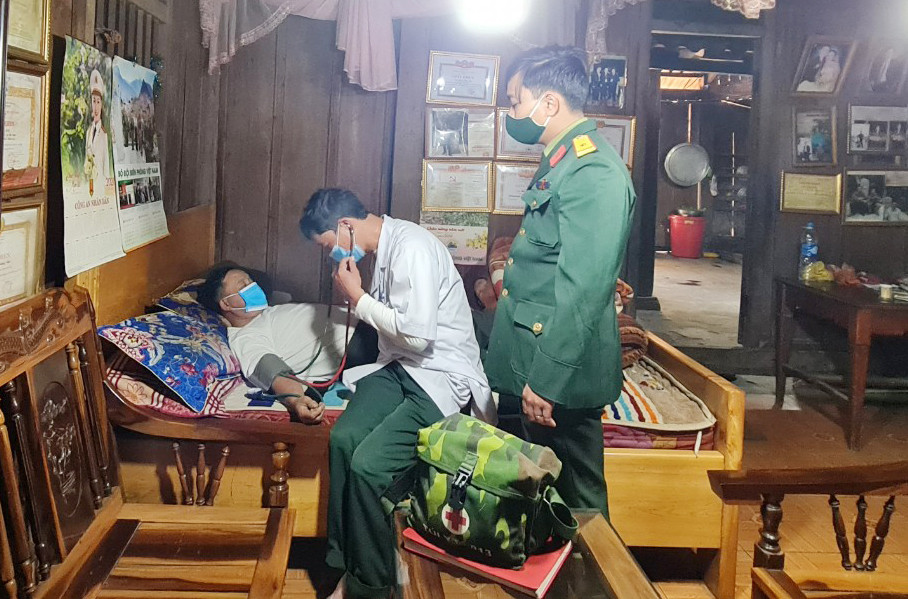 |
| Medical staff of Military Economic Group 4 went to the homes of people in Na Ngoi commune to examine and treat them. Photo: Hoai Thu |
Not long before, the infirmary also received the case of Ms. Mua Y Po from Phu Kha 1 village who came to the infirmary in a breech pregnancy. Breech pregnancy is not a rare case, but it is an abnormal condition of the fetus and has many dangerous factors for both mother and child. If not handled properly, it can be very difficult for the baby's head to come out, leading to the baby suffocating. Luckily for Ms. Y Po, the infirmary doctors intervened in time to help the fetus return to the correct position, helping the mother and child to be safe. "If both pregnant women Mua Y Po and Ha Y Dia had come a little later, the lives of both mother and child would have been difficult to preserve because the transverse position of the fetus would not have been able to be born without intervention," said Dr. Minh.
Talking about cases of people giving birth, getting sick and being on the brink of life and death, doctors and nurses said that each time they successfully saved a patient, they gained more determination and love for their profession and for the villages on the border of the Fatherland. On a trip to the base in Ka Tren village, there were some elderly people who could not come to the gathering place, so the doctors went to their homes to examine them. Among them was the case of Old Man No Po, in a house on the side of the road, Old Man Po lay in one place with his whole body swollen and puffy.
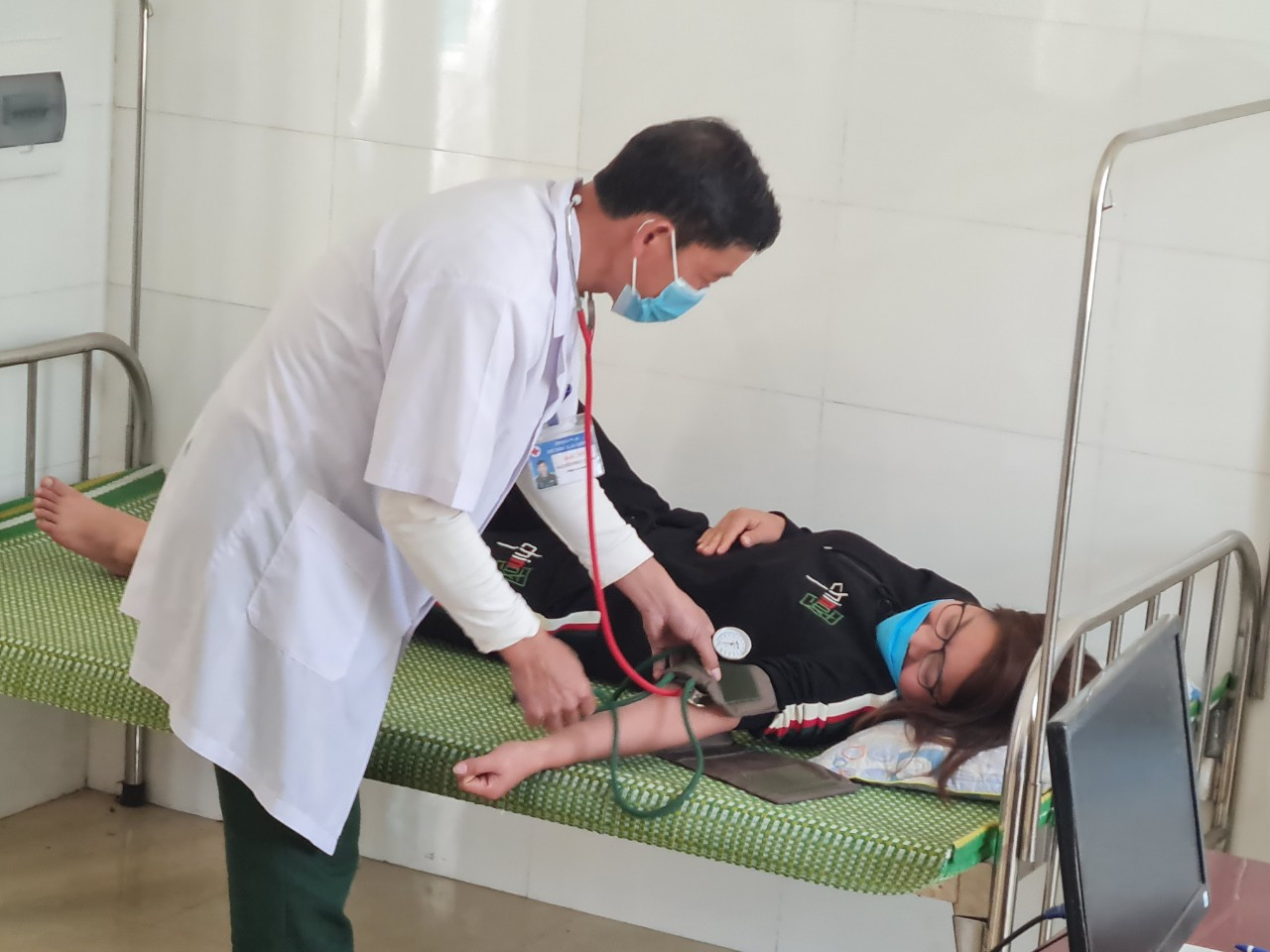 |
| People come to get free medical examination and treatment at the Military Medical Clinic of Economic Group 4. Photo: Hoai Thu |
Mr. Po's relatives said that the family determined that he was "close to death", only counting each day, not knowing when he would "go". When asked why the family did not take him to the doctor, Mr. Po's wife and children said that the family was poor and could not afford to take him for treatment. After examining and diagnosing him with bone and joint disease and diabetes, the doctors gave him medicine and advice, persuading the family to take him to the hospital for treatment, the infirmary supported part of the cost. Not long after that, the family took him for treatment and now his condition has improved, the swelling has gone away, he can walk normally, and lives happily with his family. Every time he meets the doctors, Mr. Po holds their hands and says "thank you, soldiers and doctors, for saving my father from the brink of death".
On the eve of the Lunar New Year of the Tiger, when the doctors examined his health, the Chief of Phu Kha 2 village, Mr. Mua Chong Cha, was very happy and expressed his gratitude to the doctors. He said that about ten years ago, the people of Na Ngoi were very poor. Phu Kha 2 village was the same. In addition to receiving attention from the government, the people also benefited from the help of officers and soldiers of the National Defense Economic Group 4. Previously, when there was no infirmary, sick people who needed treatment had to go to Muong Xen, but at that time the road was difficult so it took a whole day to get there. The people were supported by the army with buffalo and cow breeds for raising, and 24 poor households of Phu Kha 2 village were supported to build solid houses; and helped with ginger and galangal seeds to develop the economy. In 2021, the National Defense Economic Group 4 supported the village to build a spacious and beautiful cultural house.
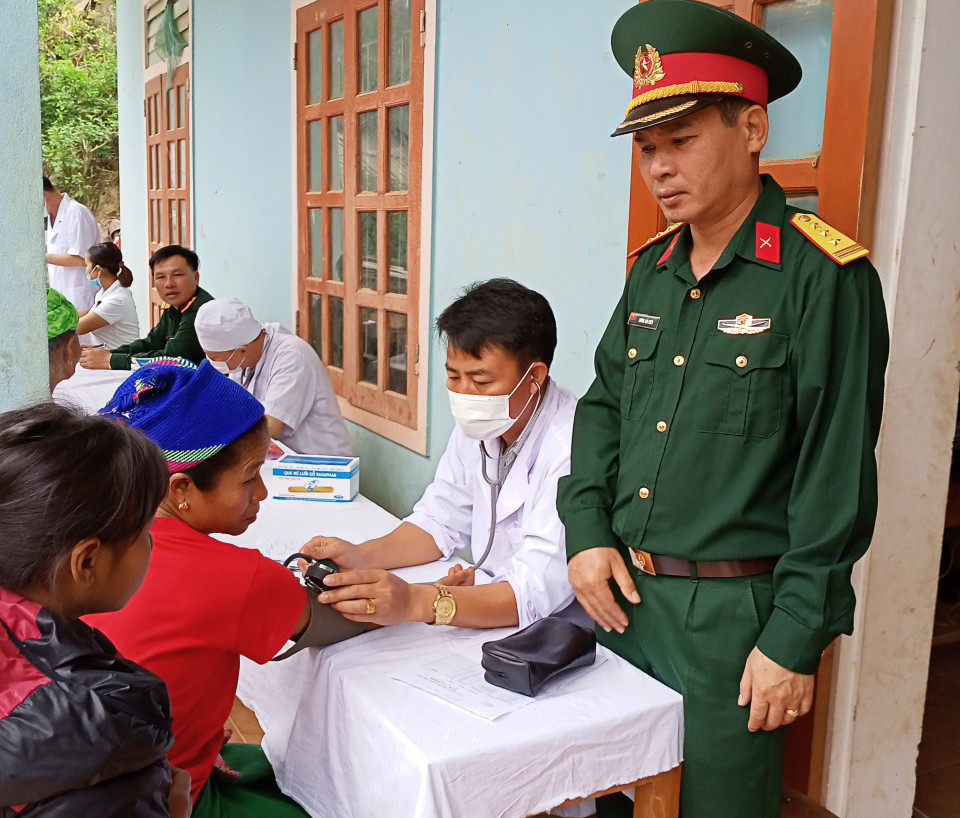 |
| Military Medical Corps 4 provides free medical examination and treatment to people in Na Ngoi and Nam Can communes. Photo: Hoai Thu |
Colonel Chu Huy Luong - Political Commissar of the 4th National Defense Economic Group said that the area under the responsibility of the 4th National Defense Economic Group spans over 75 villages in 8 communes of the two districts of Ky Son and Que Phong. Officers and soldiers not only carry out political tasks, but also provide free medical examination and treatment and coordinate with the locality to help people develop the economy and reduce poverty. Last year, the Infirmary examined and treated 1,921 patients, including 262 inpatients, 140 patients were transferred to other hospitals, and 20 patients in the villages were successfully treated; health care consultations were provided to 3,000 people, and free medical examinations and medicines were provided to over 5,000 people.
“In addition to examining and treating patients at the infirmary, doctors and nurses also travel to villages to examine, consult, dispense medicine, and treat patients for free, combining propaganda and mobilizing people to practice a civilized lifestyle, eliminate bad customs, grasp positive information about culture, life, and legal policies to improve understanding and serve life better” - Colonel Chu Huy Luong shared.

